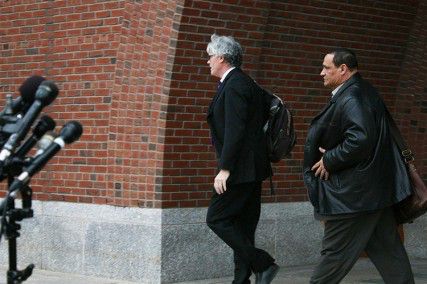
A federal judge ruled Tuesday at the U.S. District Court in South Boston that the government has until Jan. 31 to decide if they will seek the death penalty against Boston Marathon suspect Dzhokhar Tsarnaev.
Judge George O’Toole Jr. put in place the deadline after prosecutor U.S. Attorney Carmen Ortiz said they will make a confidential recommendation to U.S. Attorney Gen. Eric Holder by the end of the week, which is past the Oct. 31 deadline they initially set.
The prosecution also want to put Tsarnaev on trial in fall 2014, which the defense said was “completely unworkable” for such a complex case. The defense also have until Feb. 28 to notify O’Toole if they plan to petition for a change of venue for the trial, such as in another state, to seek an impartial jury.
Tsarnaev, 20, has 30 charges against him, some of which carry the possibility of the death penalty, for allegedly planting bombs at the finish line of the Boston Marathon on April 15. The bombs injured more than 260 people and killed three people. He was captured after a prolonged manhunt that week on April 19 in Watertown and his brother Tamerlan, who allegedly helped him, was killed during a firefight.
Tsarnaev plead not guilty to all charges on July 10.
If the Department of Justice seeks the death penalty, prosecutors said the trial could potentially last three months and a separate sentencing trial could last another two months if they seek the death penalty.
“This is obviously a significant event in the life of the case,” O’Toole said. “I think it’s something we need to know. Three months from now is enough.”
O’Toole said he would take everything into advisement and made no ruling on the decision.
Defense lawyers also argued that the conditions of Tsarnaev’s confinement at Fort Devens are too restrictive and the “Special Administrative Measures,” or restrictions placed on Tsarnaev on whom he can talk to, including members on his defense team, were unjustifiably limiting their access to their client and violated his Sixth Amendment right to a fair trial.
“The problem is who gets to decide which materials are legitimate materials related to defense and which aren’t,” said defense attorney Timothy Watkins. “Given the qualifications and the clearances the defense has already undergone to be able to go into the detention facility, it’s really a restriction where there’s no reason for it.”
The American Civil Liberties Union of Massachusetts filed an amicus brief on Nov. 6 arguing that the restrictions on Tsarnaev are unconstitutional because it makes it more difficult for the defense to make their case. O’Toole ruled on Monday that the ACLU would not be permitted to speak on Tsarnaev’s behalf and barred them from the courtroom.
Prosecutors said the restrictive measures are necessary to ensure that Tsarnaev does not commit more acts of terrorism.
“The government has nothing to hide,” said U.S. Attorney William Weinreb. “We are not in any way attempting to inhibit the defense from conducting a thorough investigation of this case. Obviously, it was a potential death-penalty case from the start. They don’t have to open their files to us and we don’t have to open our files to them.”
Weinreb said they have worked with the defense to give access to documents, but acknowledged that they did not turn over the copies of the medical records of the over 260 bombing victims or the autopsy photos of the three spectators killed.
“We have voluntarily stepped up and combed through all of our files carefully to identify both evidence that the defense has identified as mitigating and that we have identified as mitigating early so they have the benefit of that evidence,” he said. “We’ve erred on the side of caution and we’ve produced everything we believe corresponds to genuine categories of favorable material evidence that they could use.”
Miriam Conrad, defense attorney, said they have filed Freedom of Information Act requests to obtain more information from the government and prosecutors were trying to speed up the process of the case without fairly sharing evidence.
“This is not a level playing field,” she said. “We don’t have a grand jury. We don’t have the power to subpoena witnesses and hold them in contempt if they don’t appear. They have the attitude of ‘we’ll give it to you if we feel like it, when we feel like it.’ It appears the government is trying to retain every possible advantage in this case for itself.”
O’Toole said he would take both arguments under advisement and scheduled the next status conference for Feb. 12.





















































































































